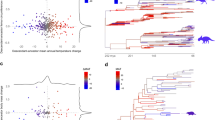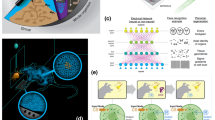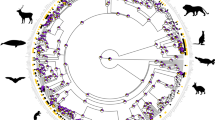Abstract
THE stability of social groups requires that conflicts among group members somehow be resolved. Recent models predict that sub-ordinates may be allowed limited reproduction by dominant colony-mates as an inducement to stay and aid dominants1– For such 'social contracts' to be evolutionarily stable, attempted reproductive cheating by dominants must be punishable3. In the eusocial paper wasp, Polistes fuscatus, subordinate queens that co-found nests with dominant queens usually disappear after the first workers emerge, so subordinates lay most of their reproductive-destined eggs just before worker emergence. Thus subordinates should be very sensitive to reproductive cheating during the latter period but relatively insensitive when worker-destined eggs are laid. Here we find in a series of egg-removal experiments designed to mimic egg-eating that subordinates do not change their aggressiveness when worker-destined eggs are removed, but that they greatly increase their aggression when reproductive-destined eggs are removed, especially when the queens are of similar size.
This is a preview of subscription content, access via your institution
Access options
Subscribe to this journal
Receive 51 print issues and online access
$199.00 per year
only $3.90 per issue
Buy this article
- Purchase on Springer Link
- Instant access to full article PDF
Prices may be subject to local taxes which are calculated during checkout
Similar content being viewed by others
References
Vehrencamp, S. L. Am. Zool. 23, 327–335 (1983).
Reeve, H. K. in The Social Biology of Wasps (eds Ross, K. & Matthews, R.) 99–148 (Cornell University Press, Ithaca, 1991).
Reeve, H. K. & Ratnieks, F. L. in Queen Number and Sociality in Insects (ed. Keller, L.) (Oxford University Press, Oxford, in the press).
West-Eberhard, M. J. Misc. Publ. Mus. Zool. Univ. Mich. 140, 1–101 (1969).
Noonan, K. M. in Natural Section and Social Behavior (eds Alexander, R. D. & Tinkle, D. W.) 18–44 (Chiron, New York, 1981).
Metcalf, R. A. Am. Nat. 116, 642–654 (1980).
Metcalf, R. A. & Whitt, G. S. Behavl Ecol. Sociobiol. 2, 339–351 (1977).
Gamboa, G. X. Heacock, B. D. & Wiltjer, S. J. J. Kansas Entomol. Soc. 51, 343–352 (1978).
Fistiwild, T. G. & Gamboa, G. J. Anim. Behav. 43, 95–102 (1992).
Pfennig, D. W. & Klahn, J. E. Z. Tierpsychol. 67, 198–203 (1985).
Klahn, J. E. thesis, Univ. Iowa (1981).
Strassmann, J. E. Florida Entomol. 64, 74–88 (1981).
Pardi, L. Physiol. Zool. 21, 1–13 (1948).
Pfennig, D. W., Reeve, H. K. & Shellman, J. S. Anim. Behav. 31, 412–416 (1983).
Pfennig, D. W., Gamboa, G. J., Reeve, H. K., Shellman-Reeve, J. & Ferguson, I. D. Behavl. Ecol. Sociobiol. 13, 299–305 (1983).
Reeve, H. K. & Gamboa, G. J. Behaviour 102, 147–167 (1987).
Reeve, H. K. & Gamboa, G. J. Behavl. Ecol. Sociobiol. 13, 63–74 (1983).
Author information
Authors and Affiliations
Rights and permissions
About this article
Cite this article
Reeve, H., Nonacs, P. Social contracts in wasp societies. Nature 359, 823–825 (1992). https://doi.org/10.1038/359823a0
Received:
Accepted:
Issue Date:
DOI: https://doi.org/10.1038/359823a0
This article is cited by
-
Giant babax (Babax waddelli) helpers cheat at provisioning nestlings in poor conditions
Behavioral Ecology and Sociobiology (2023)
-
Colony-founding success of pleometrosis in a fungus-growing termite Odontotermes formosanus
Behavioral Ecology and Sociobiology (2018)
-
Ovarian indexes as indicators of reproductive investment and egg-laying activity in social insects: a comparison among methods
Insectes Sociaux (2013)
-
Unfavourable environment limits social conflict in Yuhina brunneiceps
Nature Communications (2012)
-
Busy as a Bee or Unemployed?: Shifting Scientific Discourse on Work
Minerva (2012)
Comments
By submitting a comment you agree to abide by our Terms and Community Guidelines. If you find something abusive or that does not comply with our terms or guidelines please flag it as inappropriate.



